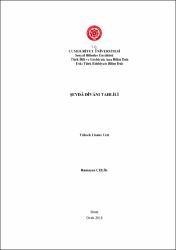| dc.contributor.advisor | Akkaya, Hüseyin | |
| dc.contributor.author | Çelik, Ramazan | |
| dc.date.accessioned | 2022-04-28T09:20:49Z | |
| dc.date.available | 2022-04-28T09:20:49Z | |
| dc.date.issued | 2018 | tr |
| dc.date.submitted | 2018-01-05 | |
| dc.identifier.other | V, 257 sayfa | |
| dc.identifier.uri | https://hdl.handle.net/20.500.12418/12582 | |
| dc.description.abstract | Şahin Uçar, yaklaşık yedi yüzyıl devam eden klasik Türk edebiyatının günümüzdeki temsilcilerinden biridir. Tarih profesörlüğünün yanı sıra, şair, hattat, müzehhip, müzisyen ve filozof gibi vasıflarıyla da tanınan bir bilim ve sanat adamıdır.
Manzum mensur birçok eserinin arasında en dikkate değer eserlerinden biri de Dîvân‟ıdır. Bu çalışmada şairin Dîvân‟ı tahlil edildi. Dîvân‟ında “şeydâ” mahlasıyla şiirler yazan şahin Uçar, gazel, kaside, terkib-i bent, terci‟-i bent, müsebbâ, mersiye gibi klasik edebiyatın hemen hemen bütün nazım şekillerini ve türlerini kullanmıştır. Bu çalışmada şairin hayatı, edebî şahsiyeti, eserleri üzerinde durulmuş, Dîvân‟ı muhteva ve biçim yönünden incelenmiştir.
Klasik Türk edebiyatı kültürünü günümüzde temsil eden şairin bu eseri, moderniteye karşı geleneğin direnişinin bir numunesi olarak görülebilir. şahin Uçar‟ın Dîvân‟ı bu yönüyle, geleneğin tesirinin bugün de devam ettiğini göstermekte ve geçmişimizi istikbale taşıyacak bir mahiyet arz etmektedir. | tr |
| dc.description.abstract | Şahin Uçar is one of the contemporary representatives of classical Turkish literature, which has lasted for about seven hundred years. In addition to being a professor of history, he is a man of science and art, also known as a poet, calligrapher, illuminator, musician and philosopher.
One of the most remarkable works among his other works of poetic prose is his Dîvân. In this study, the poet's Dîvân was analyzed. ġahin Uçar, writing poems in the pseudonym of "ġeyda" in his Divan, used almost all verse forms and genres of classical literature such as ode (gazel), eulogy (kaside), terkib-i bent, terci‟-i bent, müsebbâ, elegy (mersiye). In this study, the poet's life, literary personality, and works are emphasized and his Dîvân is examined in terms of content and form.
This piece of work by the poet, who represents the culture of classic Turkish literature today, can be seen as an example of opposition of tradition against modernity. By this way ġahin Uçar‟s Dîvân shows that the effect of this tradition is going on even today and presents a reality that will carry our past to the future. | tr |
| dc.language.iso | tur | tr |
| dc.publisher | Sivas Cumhuriyet Üniversitesi - Sosyal Bilimler Enstitüsü | tr |
| dc.rights | info:eu-repo/semantics/openAccess | tr |
| dc.subject | Şeydâ | tr |
| dc.subject | Divan | tr |
| dc.subject | Gazel | tr |
| dc.subject | Beyit | tr |
| dc.subject | Âşık | tr |
| dc.subject | Sevgili | tr |
| dc.title | Şeydâ Dîvânı Tahlili | tr |
| dc.type | masterThesis | tr |
| dc.contributor.department | Sosyal Bilimler Enstitüsü | tr |
| dc.relation.publicationcategory | Tez | tr |















